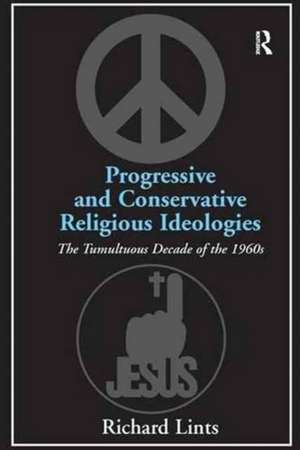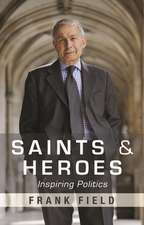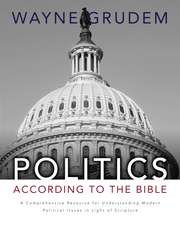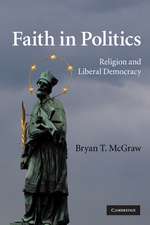Progressive and Conservative Religious Ideologies: The Tumultuous Decade of the 1960s
Autor Richard Lintsen Limba Engleză Paperback – 28 noi 2016
| Toate formatele și edițiile | Preț | Express |
|---|---|---|
| Paperback (1) | 469.34 lei 6-8 săpt. | |
| Taylor & Francis – 28 noi 2016 | 469.34 lei 6-8 săpt. | |
| Hardback (1) | 1060.25 lei 6-8 săpt. | |
| Taylor & Francis – 28 sep 2010 | 1060.25 lei 6-8 săpt. |
Preț: 469.34 lei
Nou
Puncte Express: 704
Preț estimativ în valută:
89.81€ • 93.77$ • 74.33£
89.81€ • 93.77$ • 74.33£
Carte tipărită la comandă
Livrare economică 05-19 aprilie
Preluare comenzi: 021 569.72.76
Specificații
ISBN-13: 9781138278677
ISBN-10: 113827867X
Pagini: 256
Dimensiuni: 156 x 234 mm
Greutate: 0.45 kg
Ediția:1
Editura: Taylor & Francis
Colecția Routledge
Locul publicării:Oxford, United Kingdom
ISBN-10: 113827867X
Pagini: 256
Dimensiuni: 156 x 234 mm
Greutate: 0.45 kg
Ediția:1
Editura: Taylor & Francis
Colecția Routledge
Locul publicării:Oxford, United Kingdom
Notă biografică
Richard Lints is Andrew Mutch Distinguished Professor of Theology, Gordon-Conwell Theological Seminary, and has also taught at Trinity College (Bristol, UK), Yale Divinity School, Reformed Theological Seminary, and Westminster Theological Seminary. He has authored and/or edited: The Fabric of Theology (Eerdmans, 1993), Philosophical Terms for Theologians (Westminster/John Knox 2003) Personal Identity in Theological Perspective (Eerdmans 2004) as well as having published articles in journals such as Religious Studies, Journal of the American Academy of Religion and Modern Reformation. In addition he is presently working on two book length manuscripts: Identity and Idolatry and What Difference Does Difference Make: Ecclesiology, Democracy and the Clash of Traditions.
Recenzii
'Richard Lints provides an illuminating account of the intellectual, cultural, and religious transformation of America in the 1960s. Lints's exposition is filled with keen insights concerning all these topics and by emphasizing the complex roles of religious beliefs in the era he also offers fresh perspectives. This is a work of cultural analysis that rewards careful reading.' George Marsden, University of Notre Dame, USA '[Lints's] book is an important corrective to the cartoon version of the '60s as a fight between reactionary religion and progressive secularity.' Church Times 'Richard Lints has provided a brilliant interpretation of what actually happened in the Sixties that puts religion at the centre of the picture. The range of sources he can draw on is impressive. As well as being familiar with evangelicalism, he is also able to chart the history of Anglo-American philosophy in the 20th century, arguing that the end of foundationalism was the key event in the second half of the 20th century. Despite the range of material, Lints writes clearly and many readers will be excited by the story he tells. To people like me who came of age in this period, he makes sense of the experiences we passed through and helps us to come to a retrospective understanding of what was happening in those heady days.' Church of England Newspaper
Cuprins
Introduction The Problem of Naming; Part 1 Protest as Upheaval and Retrieval; Chapter 1 Revolutions and Ruins: The 1960s and the Paradoxes of Interpretation; Chapter 2 The Identity of Crisis: Postmodernity and the 1960s; Part 2 Protest and Irony; Chapter 3 The Stirrings of Change: Civil Rights and the Ideology of Race; Chapter 4 The Critique of Mass Culture and the End of Ideology; Chapter 5 The Ideology of Gender and the Rebirthing of Feminism; Part 3 Hopeful Pessimists; Chapter 6 The End of Epistemology and The Death of Foundationalism; Chapter 7 The Death Beyond the Death of God: Radical Theology in the 1960s; Part 4 Hesitant Radicals; Chapter 8 A Secular Voice Against Secularity; Chapter 9 Radical Retrieval: Evangelicals and the Story of the 1960s; Part 5 Conclusion; Chapter 10 The Migration of Conviction: From Protest to Retrieval and Back Again;
Descriere
This book explores the surprisingly disruptive role of religion for progressive and conservative ideologies in the tumultuous decade of the 1960s. Conservative movements were far more progressive than the standard religious narrative of the decade alleges and the notoriously progressive ethos of the era was far more conservative than our collective memory has recognized. Lints explores how the themes of protest and retrieval intersect each other in ironic ways in the significant concrete controversies of the 1960s - the Civil Rights Movement, Second Feminist Movement, The Jesus Movements, and the Anti-War Movements - and in the conceptual conflicts of ideas during the era - The Death of God Movement, the end of ideology controversy, and the death of foundationalism. Lints argues that religion and religious ideologies serve both a prophetic function as well as a domesticating one, and that neither "conservative" nor "progressive" movements have cornered the market in either direction. In the process Lints helps us better understand the complex role of religion in cultural formation.
















